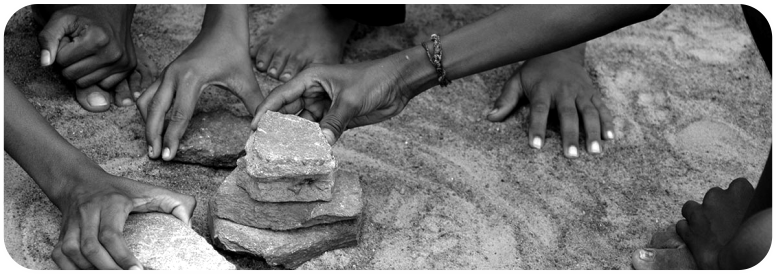Now-a-days schooling starts at the age of 3. The moment a child enters the classroom, most of the preschool in India handed a pencil to hold, without any consideration of his weak fine motor skills.I remember, in one of my counseling session in preschool of Rajasthan with some parents, I came across a very interesting question. Looking deeply at me, with curious eyes was a father who asked me in a blunt tone ““हम भी तो पढ़े है मैडम जी तब ये चोचले नहीं होते थे अब क्यों?” (We thave studied in schools as well, we didn’t have these elaborate teaching techniques. So why now?)

His question took me back to my childhood. In my generation, we started our schooling at 6. Then what was I doing from age 3 to 6? How were my skills developed?The answer lies in a conversation I had with my mother. I was talking to her over the phone when she suddenly started scolding my nephew, “सारा दिन कुछ नहीं करता बस फ़ोन और टीवी , हमारे बच्चे ऐसे नहीं थे.” (all you do the entire day is waste time on phone and T.V. My children were not like that).

This made me ask her, “how were your children then?”. This gave her an opportunity to let her anger and frustration out. She told me how, there were joint families ,where all the little cousins would play games like satoliya/seven stones a game where children had to arrange stones according to sizes making children apply their brains (eye hand co-ordination, balancing, cognitive development).
She recalled how we would help her in the kitchen with basic chores like filling bottles (holding, grasping), using the dough to play and try to make small chapattis and how she’d cook them to encourage and please us (fine motor skills, sensory development). She told me about our tree climbing events, cricket and football matches (gross motor skills, strengthen griping)
After dinner we used to play antakshri or sing bhajans (language development) after which we all helped in arranging beds on the roof top (team work). We never went to sleep without listening to stories (moral values, thinking and imagination skills).When we cried, we had our grandmothers to provide all the support we needed (emotional development). We celebrated every function, wedding, festival together (social development). Playing mud, boosted our immunity.But these things are simply absent in today’s scenario. Parents are busy working. Families are small. People don’t even communicate and socialize anymore. There are single children who have nobody to play with. Children don’t even wish to step out with their friends to play. They have restricted exposure to nature, almost no interaction with their relatives and absolutely nothing to do except being engrossed in their phones. She ended her rant with the hope that maybe this situation will change when he goes to school.
The conditions in which these children are being brought up, it is natural for parents to have high expectations from schools. I believe school has to play the role of dadis and nanis, they are supposed to be the cousins, for every single child.
Preschools are responsible for developing skills, for inculcating values in children. Only schools can improve their thinking ability. Only they can introduce them with nature.
So to answer the question, these elaborate techniques are necessary to make up for the atmosphere that is now absent. Don’t be in a hurry. Let your child attain the required skills at their own pace. Instead of forcing a sword (pencil) into your child’s hand, expecting him to fight his battles, give him time, the patience, and the support to be capable of wielding it. Always remember, without continual growth and progress, heavy words like “improvement” “achievement” and “success” have no meaning whatsoever.
When we are going for preschool admission inquiry, always remember skill development in the early years is very essential. Let them grow; see their progress, within the boundaries of traditional teaching methods, we are helpless. Let’s explore outside the boundaries, find your child a surrounding where they can enhance their skills and can wield the sword when they are ready for the battle.
Author: Shalini Dixit
( Training and Learning Development Head )
Canvas International School

